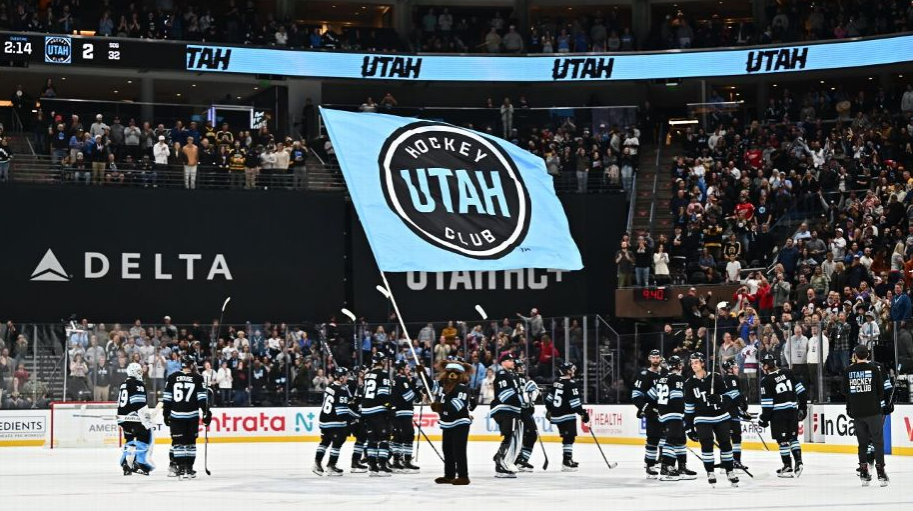
Utah Hockey Club’s Strategy for Long-Term Success

SALT LAKE CITY — The Utah Hockey Club (UHC) is on a mission to prove that Salt Lake City and the broader state of Utah can support a thriving NHL franchise. This goal, rooted in the state’s deepening sports culture, is driven by the belief that Utah’s growing population and economic strength can sustain professional hockey in the same way that basketball has flourished through the Utah Jazz.
The team’s journey began with a high-profile relocation from Arizona, where it was previously known as the Coyotes, and before that, the Winnipeg Jets. Now, the UHC is tasked with establishing hockey as a mainstay in Utah, aiming to build a fanbase that could rival the Jazz’s decades-long success in the NBA.
One of the key drivers of this vision is the state’s rapidly expanding economy, with Utah now ranked as having the third-best economy in the nation, combined with its distinction as the youngest state by median age. This makes Utah an ideal location for the growth of a new sports franchise. Chris Armstrong, the UHC’s president of hockey operations, believes that Salt Lake City’s rapid growth outpaces many other cities in North America, offering a great opportunity for a fresh sports franchise.
Historically, Utah’s sports culture has been rooted in major college programs like BYU and the University of Utah, but professional sports have grown steadily over the past few decades. The arrival of the Utah Jazz in 1979, followed by the introduction of Real Salt Lake in 2004, has further cemented Utah as a destination for professional sports. The UHC is looking to follow in these footsteps, with the added challenge of bringing a new sport to the state.
Josh Furlong, a local broadcaster, believes that Utahns are eager to prove they are more than just a “flyover” state, seeking recognition alongside other major cities like Los Angeles and New York. The area’s natural beauty and passionate fan base provide a strong foundation for success, Furlong says.
As the UHC strives for success, Armstrong and others have pointed to Salt Lake’s burgeoning reputation on the global stage, with the city set to host the Winter Olympics again in 2034. This will make Salt Lake City one of the few cities in the world to host the Olympic Games multiple times, further boosting the area’s visibility.
With an already substantial demand for tickets — the UHC secured more than 30,000 season-ticket deposits ahead of its first season, similar to expansion teams like the Seattle Kraken — the franchise is poised for success. Armstrong also expressed confidence that the team could become one of the top revenue and ticket-selling teams in the NHL, even while playing in a basketball-first venue.
However, challenges remain. The Utah Jazz’s long-established fanbase, which spans generations, presents a unique challenge for the UHC in terms of fan engagement. The team quickly set out to attract local support, organizing community events and polling fans for the team’s name. Chris Barney, president of revenue and commercial strategy for Smith Entertainment Group (SEG), the UHC’s parent company, highlighted that youth engagement is a key strategy. By creating youth hockey programs similar to the Junior Jazz basketball league, SEG aims to foster long-term fandom by introducing young people to the sport early on.
In addition, the team is focused on making the experience accessible to a broad audience. While ticket prices for the first season may be higher, the UHC plans to create a multi-tiered pricing structure that includes affordable options for families. The Delta Center’s ongoing renovation, which will add 6,000 unobstructed seats, is expected to make the arena more accessible to fans of all economic backgrounds.
The long-term success of the UHC will also depend on community partnerships and efforts to make hockey a part of the local sports culture. Barney emphasized that the organization is “all in” on developing the sport in Utah, drawing on SEG’s existing relationships with local recreation departments and the Junior Jazz program.
While there are financial challenges — particularly in a state experiencing rapid growth and rising costs — the UHC’s leadership is optimistic that the area’s economic strength and sports culture will allow the team to thrive.
One of the club’s main goals is to create a fan base similar to that of the Jazz, which has sold out 296 consecutive games. Armstrong notes that for many people in Utah, attending a sporting event at the Delta Center will be a new experience. This gives the UHC an opportunity to engage with a previously untapped audience.
Ultimately, the UHC’s strategy hinges on community involvement, youth development, and a commitment to making professional hockey accessible to Utahns of all ages and backgrounds. With the state’s growing economy, expanding population, and increasing demand for professional sports, the UHC is well-positioned to make hockey a fixture in the Salt Lake City sports landscape for years to come.

Leave a Reply